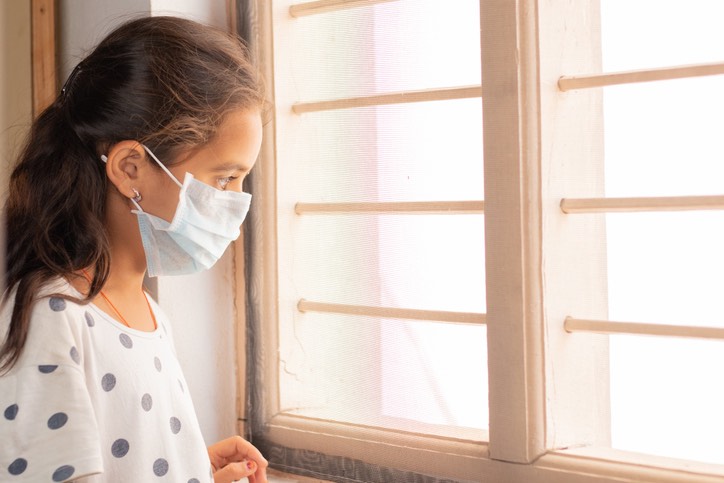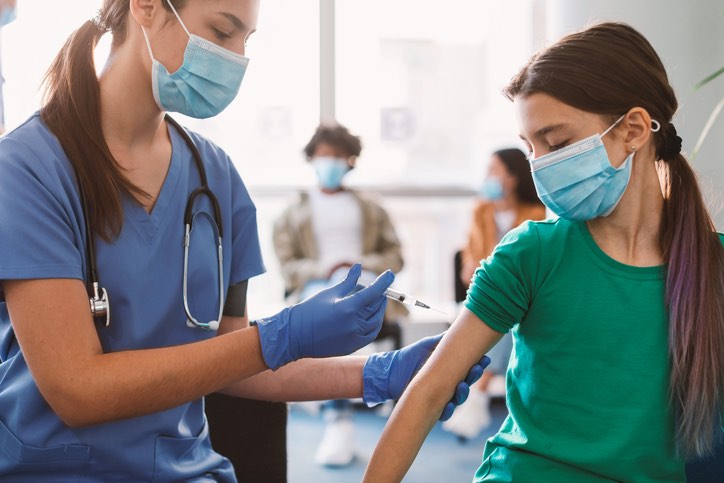New Studies Show the Effects of the COVID-19 Pandemic on Early Puberty in Girls

The COVID-19 pandemic has been linked to many health issues and now researchers are looking into whether it’s responsible for early puberty in more girls. Pediatricians in the U.S., Italy, India, and around the world, have all reported increased cases of early puberty since the pandemic started.
Early onset puberty, also known as precocious puberty, occurs when children begin experiencing the changes seen in puberty earlier than age 8 in girls and age 9 in boys, which are considered normal ages.
Related: Does My Child Need a COVID-19 booster?
We’re going to explore some of the causes of early puberty as well as the impact of the COVID-19 pandemic We’ll also look at the signs of early puberty so that you can help your child deal with the change their bodies are going to go through at a young age.
The Impact of COVID-19 on Early Onset Puberty

While the cause of early onset puberty may differ from child to child, statistics do show a significant increase in the number of cases since the COVID-19 pandemic began. This has researchers looking into whether the lifestyle changes the Coronavirus prompted played a role.
Are More Girls Going Through Puberty Early?
A January 2021 study looked at children across five Italian centers of pediatric endocrinology. Researchers found that 328 girls were referred for suspected precocious puberty over seven months between March and September 2020, as opposed to 140 during the same period in 2019.
What was different during those two time periods? Researchers believe the lifestyle changes related to the lockdown prompted by the pandemic may have led to a higher prevalence of precocious puberty in girls.
Another study done in Germany found that while the number of girls diagnosed with early puberty remained constant between 2015 and 2019 (less than 10 cases a year), it more than doubled in 2020 to 23 cases. The number continued to rise in 2021, reaching 30 cases.
In Turkey, during a systematic review of early puberty, researchers also found an increase in the number of girls who went through puberty early during the pandemic than in years prior. Healthcare professionals in the United States are seeing similar trends with an increased incidence of precocious puberty since the pandemic began.
What Causes Early Onset Puberty?

When a child starts experiencing early onset puberty, many parents want to know why it’s happening and if it’s something they may have done to cause it. For many children, there is no underlying medical condition.
As children start going through puberty, the brain beings producing a hormone called gonadotropin-releasing hormone (GnRH). When this hormone reaches the pituitary gland which is connected to the hypothalamus in the brain, it makes the body produce more hormones, estrogen in girls and testosterone in boys. These hormones are responsible for the growth and development of sexual characteristics. When kids go through precocious puberty, these steps start sooner than normal.
Types of Precocious Puberty
As kids go through the early onset of puberty, there are two different types they can experience.
1. Gonadotropin-dependent (Central Precocious Puberty)
This is the most common type. This occurs when the body starts to secrete hormones earlier than normal. In most cases, no cause can be found. In rare cases, central precocious puberty may be caused by:
- A tumor in the brain or spinal cord
- A birth defect
- Hypothyroidism
- Tumors or growths on the ovaries
- McCune-Albright syndrome (a rare genetic disease that causes hormonal problems)
2. Gonadotropin-independent
This type of puberty is not caused by the early release of hormones. Rather, it is caused by the early secretion of high levels of sex hormones.
If there is a family history of early onset of puberty, a child may have a greater risk of developing it themselves. Your healthcare provider will ask about your family history and may do blood tests to determine hormone levels to determine whether your child is going through early puberty.
Signs of Early Puberty in Girls

Besides blood tests, there are physical signs that indicate girls and boys are going through early puberty. In girls, early puberty signs include:
- Pubic and underarm hair
- Breast growth
- Menstruation
- Ovulation
Signs of Early Puberty in Boys

Common signs of early puberty in boys can include:
- Pubic and underarm hair
- Facial hair
- Enlarging penis and testicles
- Acne
- Deepening of the voice
Children who go through puberty early often grow taller earlier than their classmates and may tend to be moody more than usual. During precocious puberty, the mean bone age is advanced over chronological age by about 3 years. This can result in a shorter predicted height as an adult.
Early puberty is also often linked to mental health issues in adolescents such as anxiety in boys, and depression in girls. Some girls have also experienced lower self-esteem and body image issues as a result of going through puberty earlier than their peers.
COVID-19 Lifestyle and the Early Onset of Puberty
Lifestyle changes that children experienced during the COVID-19 lockdowns of 2020 and 2021 are believed to have led to the rise of more kids experiencing puberty early. There are many areas that those in the public health sector are looking at.
Changes in Eating Habits

The pandemic saw many children eating unhealthy leading to weight gain. Children who experience obesity and have a higher BMI (body mass index), tend to mature faster than their slimmer peers.
Higher Stress Levels

Stress impacts children just as it does adults. During the pandemic, many children may have been stressed if they were sick or if they had a parent who was sick. During the uncertain and often scary days of early 2020, kids have been stressed by remote schoolwork, missing their friends, or anxiety over getting sick.
The sheer experience of what was happening around them. Regardless, the stress the pandemic caused may have been a contributing factor to the increased incidence of precocious puberty in girls.
Increased Screen Time

Another lifestyle change being looked at is the increase in screen time compared to previous years. With the increased use of electronic devices, there was less time spent outside and doing physical activities. This sedentary lifestyle has some researchers pointing the finger at the Coronavirus. Without the pandemic, children would have been more likely to continue their normal lifestyle and physical activities.
Impact on Sleep Cycles

Researchers are also looking at changes in sleep cycles and how the amount of sleep and quality of sleep can affect someone’s hormones. With remote learning, many children saw their bed and wake times change as well as the amount of sleep they got each night. In the Italian study we mentioned above, the number of girls diagnosed with early puberty during the lockdown had more disturbed sleep and went to bed later than those diagnosed before the pandemic.
The COVID-19 Virus Itself

Studies are also looking at the COVID-19 virus itself as a contributing factor. As we all know, many children did experience the virus. Researchers found that Sars-cov2 can activate receptors that can accelerate puberty onset in rats. Some say this could suggest a possible direct effect of the virus on triggering puberty.
How Will COVID-19 Affect Puberty Long-Term?
Statistics show that more children were diagnosed with early-onset puberty during the pandemic than in previous years. Early puberty occurs when a child’s body starts going through puberty earlier than the normal age.
Some believe the lifestyle changes the pandemic sparked, such as unhealthy eating, more screen time, fewer physical activities, and weight gain all played a role in the number of girls experiencing precocious puberty.
More research is being done to determine whether the pattern of the early onset of puberty changes as we back away from the lifestyle the pandemic sparked.
For more information on the long-term impacts of the COVID-19 pandemic on kids and families, see our Ultimate Guide to COVID-19 for Parents.

